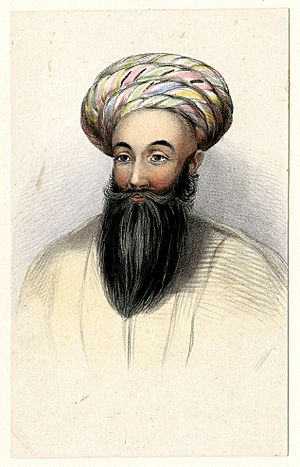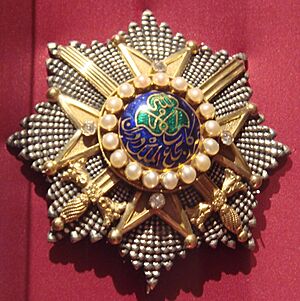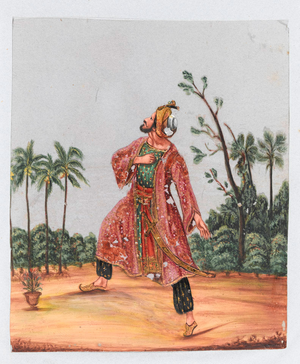Shah Shujah Durrani facts for kids
Quick facts for kids Shah Shuja Durraniشاه شجاع درانی |
|||||
|---|---|---|---|---|---|
| His Majesty Inayat-i-Ilahi Padshah Sultan Shah Shuja ul-Mulk Muhammad Bahadur,Abdali ,Dur-i-Durran, Padshah of Afghanistan | |||||

Lithograph by Lowes Cato Dickinson, after Vincent Eyre, showing Shah-Shuja-ul-Mulk
|
|||||
| Emir of the Durrani Empire | |||||
| Reign | 13 July 1803 – 3 May 1809 (First reign) 7 August 1839 – 5 April 1842 (Second reign) |
||||
| Coronation | 13 July 1803 | ||||
| Predecessor | Mahmud Shah Durrani | ||||
| Successor | Mahmud Shah Durrani Dost Mohammad Khan |
||||
| Born | 4 November 1785 | ||||
| Died | 5 April 1842 (aged 56) Kabul, Durrani Empire, now Afghanistan |
||||
| Wives |
|
||||
| Issue | Abdul Samad Khan Timur Mirza |
||||
|
|||||
| Dynasty | Durrani dynasty | ||||
| Father | Timur Shah Durrani | ||||
| Mother | a Sadozai lady | ||||
Padshah Sultan Shah Shuja Durrani (born November 1785 – died 5 April 1842) was a ruler of the Durrani Empire. He was the son of Timur Shah Durrani. Shah Shuja belonged to the Sadduzai line of the Abdali group of ethnic Pashtuns. He served as the King of the Durrani Empire twice. His first time as ruler was from 1803 to 1809. Later, he ruled again from 1839 until his death in 1842.
Becoming King of Afghanistan
Shah Shuja was a governor in Herat and Peshawar from 1798 to 1801. He declared himself King of Afghanistan in October 1801. However, he officially became king on July 13, 1803. In Afghanistan, a blind person could not be the ruler. So, his step-brother Mahmud Shah had Zaman Shah blinded, but did not kill him.
After becoming king in 1803, Shah Shuja ended a long-standing conflict with the powerful Barakzai family. He also forgave them for past issues. To create a strong bond, he married Wafa Begum, who was related to their family.
In 1809, Shah Shuja made an alliance with British India. This was to protect Afghanistan and the Punjab Region from a possible invasion by France. A British group visited Afghanistan in 1809. They described Shah Shuja as a "handsome man" with a "princely" manner. He wore the famous Koh-i-Noor diamond on his bracelet.

In June 1809, Shah Shuja was removed from power by his predecessor, Mahmud Shah Durrani. This happened after the Battle of Nimla. Shah Shuja then went to live in The Punjab. There, he was captured and held prisoner. He was first held in Attock (1811–1812) and then in Kashmir (1812–1813).
When Mahmud Shah's chief minister, Fateh Khan, attacked Kashmir with Ranjit Singh's army, Shah Shuja left with the Sikh army. He stayed in Lahore from 1813 to 1814. During this time, he was forced to give up valuable diamonds, including the Koh-i-Noor, to Ranjit Singh. He later escaped and went to Ludhiana, seeking help from the East India Company.
From 1818 onwards, Shah Shuja received money from the East India Company. They thought he might be useful to them one day. He lived a comfortable life with his family in Ludhiana.
Shah Shuja's Exile
An American man named Harlan offered to lead an army to help Shah Shuja regain his throne. Shah Shuja was very excited about returning to his home country, Kabul. He spoke fondly of its gardens, fruit trees, and music. He said, "Kabul is called the Crown of the Air."
Harlan began gathering soldiers for the invasion. However, he later became disappointed with Shah Shuja. He felt that Shah Shuja was not a good leader. Harlan described him as "a wayward tyrant" who was "vindictive" and "faithless."
In 1833, Shah Shuja made a deal with Ranjit Singh of Punjab. He was allowed to march his troops through Punjab. In return, he promised to give Peshawar to the Sikhs if they could capture it. The next year, Shah Shuja marched towards Kandahar. At the same time, Sikh forces attacked Peshawar.
In July, Shah Shuja was defeated at Kandahar. He was defeated by an alliance of local leaders and Dost Mohammad Khan. Shah Shuja had to flee. The Sikhs, however, successfully took Peshawar.
Returning to Power
In 1838, Shah Shuja gained the support of the British and Ranjit Singh. They wanted to help him take power back from Dost Mohammad Khan. The British believed that most Afghans would welcome Shah Shuja's return. However, by 1838, many Afghans did not remember him. Those who did, remembered him as a harsh ruler and did not like him.
During the march to Kabul, the main British camp was attacked by local fighters. Shah Shuja was restored to the throne by the British and Sikhs on August 7, 1839. This was 30 years after he was first removed from power. He did not remain in power after the British and Sikhs left.
After returning to power, Shah Shuja was very strict with his own people. He wanted to punish those he felt had betrayed him. This made him very unpopular with the Afghan people. He stayed mostly inside the Bala Hissar, Kabul fortress. On April 5, 1842, he was assassinated by Shuja ud-Daula, who was encouraged by his uncle Oosman Khan.


